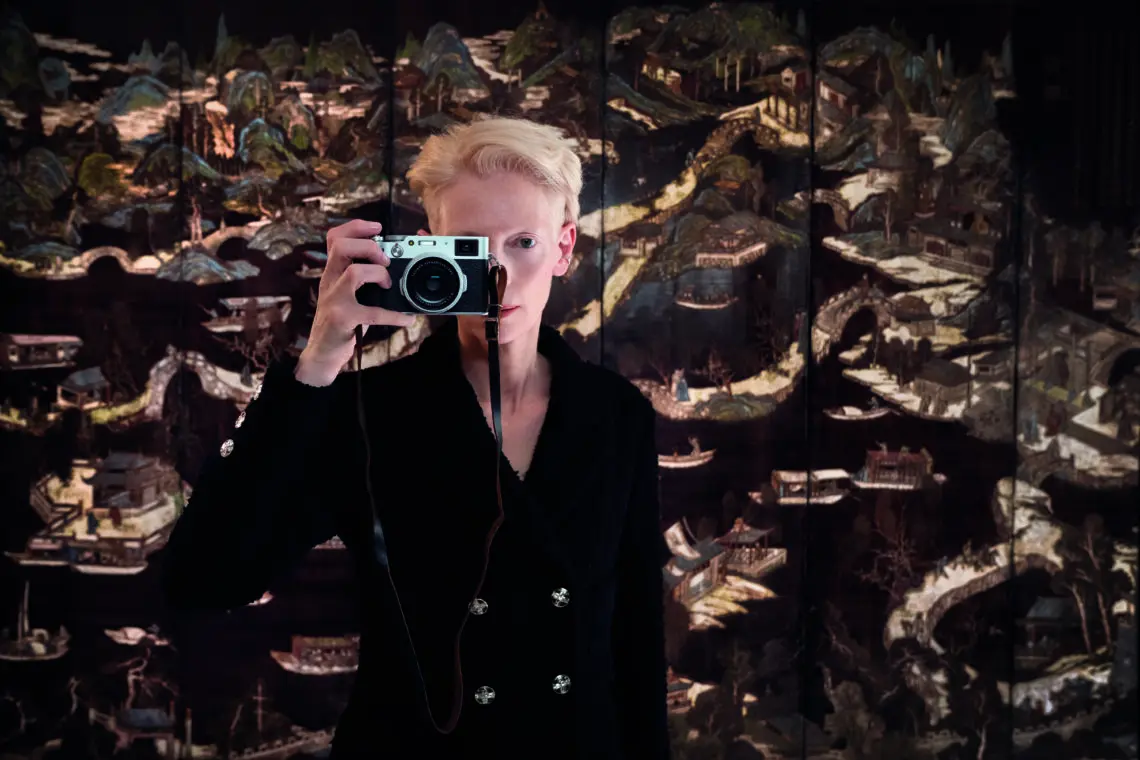Tilda Swinton stars alongside Xin Zhilei (“Blossoms Shanghai”) and Chinese pop artist Leah Dou in a short film directed by Oscar-nominated German filmmaker Wim Wenders for Chanel‘s 2024-2025 Métiers d’Art show which celebrates artistry and craftsmanship.
The show will take place Dec. 3 by the scenic West Lake in the Chinese city of Hangzhou. The latter provides a fitting backdrop for the Metiers d’Art show, given the city’s vibrant heritage of silk manufacturing and trade. The lush landscapes and lakes of Hangzhou have been a source of inspiration for many artists, notably Chanel founder Gabrielle Chanel whose imagination is reflected in Wenders’ film.
In her Paris home, Gabrielle Chanel contemplated the lake everyday, as rendered on a Chinese lacquer screen that adorned her private office at her home on Rue Cambon and was part of a collection of some twenty Coromandel pieces, dating from the 17th to the 19th centuries, that she amassed across her lifetime.
Popular on Variety
“It has been my sincere privilege to have been close to the House of Chanel for more than a dozen years, now, and my enthusiasm for the work we are able to do together only grows with every year,” said Swinton, whose work in Pedro Almodovar’s Venice Golden Lion prizewinning “The Room Next Door” has put her in the Oscar race. She previously won a best supporting Oscar for her turn in “Michael Clayton” in 2008.
“‘Chanel takes very seriously its role as cultural patron and source of support and encouragement to artists and arts institutions around the planet, and never has this work been more important, in my view,” Swinton continued.
In Wenders’ poetic film, the hypnotic screen comes to life, allowing Swinton to embark on a journey across Hangzhou where she immerses herself in the landscapes and encounters local artists. Shot on location between Paris and Hangzhou, the film blends past and present, fantasy and reality, juxtaposing the natural backdrop with symbols of modern life, from laptop screens to cameras. It also pays tribute to cross-culture dialogue.
Although she never visited China herself, Gabrielle Chanel was profoundly inspired by the images contained within her Chinese screens and these fueled her visual language. Symbols of Chinese culture appeared across her creations from the 1950s and 60s.
Wenders, whose last feature film “Perfect Days” represented Japan in the 2024 Oscar race and was nominated for best international feature, said he “spent some time in Mademoiselle Chanel’s office and studied her Coromandel screen” to prepare for the film. “It made a huge impression on me. Somehow, it was like a very early movie screen or giant comic strip that featured lots of little stories.”
“Wherever you looked, there was another scene of daily life,” he says. “The greatest inspirations for all my films have been places. Most of them started with a desire to find the story that would belong to a particular place I found and loved. That story needed to belong there and couldn’t ‘take place’ anywhere else.”
Zhilei, meanwhile, said “Hangzhou embodies a deep cultural heritage while embracing a spirit of modern innovation, a vision that aligns with Gabrielle Chanel’s pioneering ideals.”
She praised the film for “brimming with poetry, filled with charm and exploration, much like the feeling the city of Hangzhou gives me. As dusk fell, during filming, the garden’s hazy beauty left us in awe, and we captured this feeling together, sharing it through images.”
Dou said she “always believed that culture is a vital source of inspiration for artistic creation.” She finds it “fitting that so much poetry and tradition have emerged from a place like Hangzhou, as it still holds a strong cultural foundation.” “Even though it’s now a modern, advanced city, it maintains a perfect blend of culture and modernity,” Dou said.

 Italian
Italian







